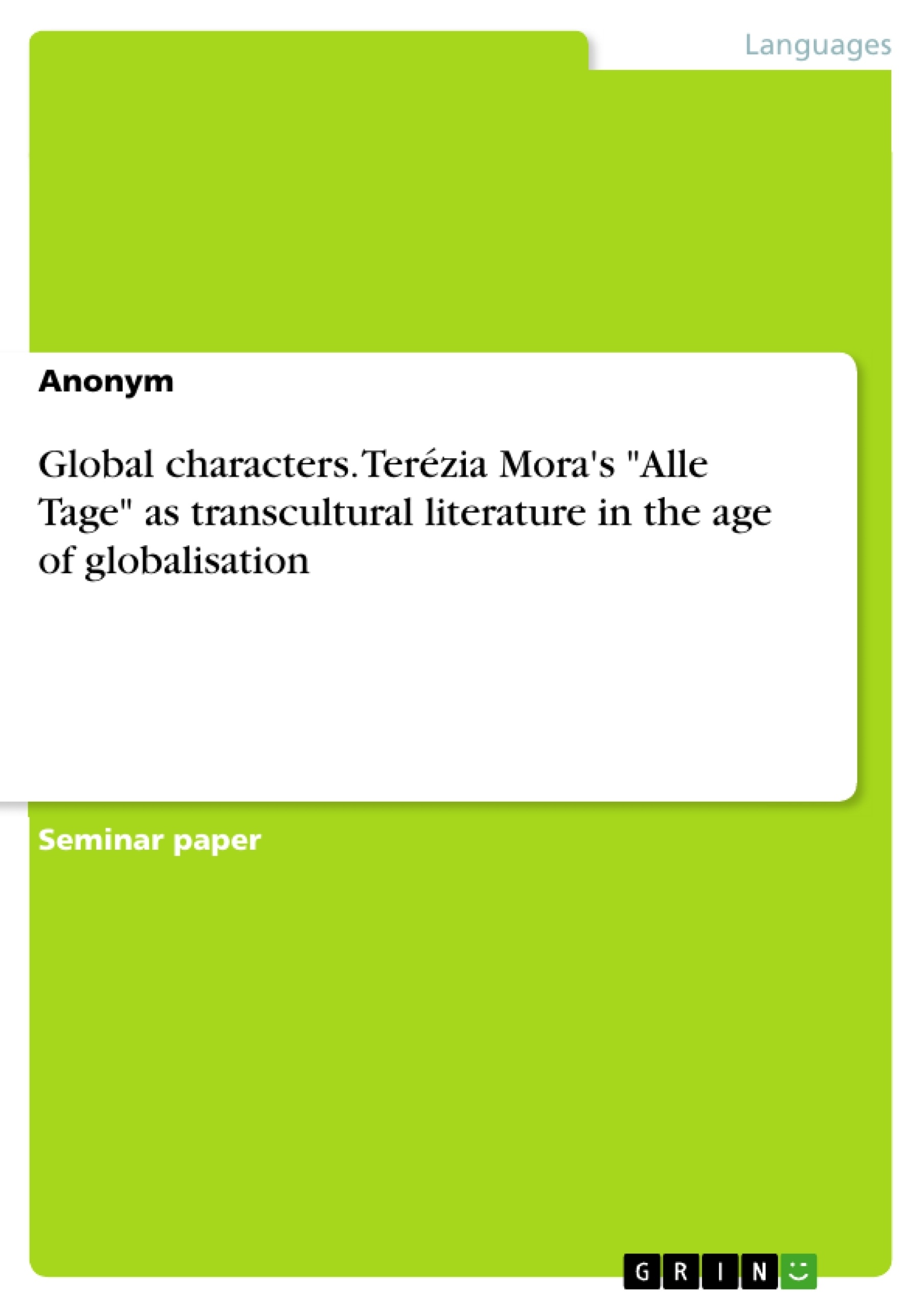In this essay, I argue that Terézia Mora with her novel "Alle Tage" ("Day In Day Out", 2004) breaks with all German literary categorisations and is able to catch the ambiguity and disorientation of the 21st century from multiple viewpoints, in the setting of migrant experience. "Alle Tage" is a piece of transcultural literature, not only in the broad sense of being "concerned with borders and borderlands between cultures", but more specifically because it is able to capture "the identities emerging from these locations" (Gerstenberger 2004: 212).
It will be the aim of this essay to show how Alle Tage is moving away from the notion of a “stable” German identity towards complex identities in the age of globalisation. In this way the migrant becomes a metaphor of the century itself, and one-sided "we" and "them" arguments become redundant. "Alle Tage" has the ability to hold a mirror up to us.
Inhaltsverzeichnis (Table of Contents)
- Introduction
- Theoretical framework
- Place and Time in Alle Tage
- Narration and language
- Global Characters
- Conclusion
Zielsetzung und Themenschwerpunkte (Objectives and Key Themes)
This essay examines Terézia Mora's novel Alle Tage (2004) and its portrayal of transcultural experience in the context of globalization. It aims to show how the novel moves away from the notion of a "stable" German identity towards complex identities in the 21st century. By analyzing the protagonist, Abel Nema, and his experiences as a migrant in Germany, the essay explores the themes of disorientation, cultural hybridity, and the fluidity of identity in a globalized world.
- Transcultural experience in the context of globalization
- The fluidity of identity in a globalized world
- Disorientation and cultural hybridity
- The role of language and place in shaping identity
- The portrayal of migration as a universal experience in the 21st century
Zusammenfassung der Kapitel (Chapter Summaries)
The introduction sets the stage for the essay by outlining the importance of understanding transcultural literature in the context of globalization. It discusses the German "Leitkultur-Debatte" (dominant culture debate) and how it has impacted the perception of immigrant writers and their works. The essay then introduces Terézia Mora and her novel Alle Tage, arguing that the novel breaks with traditional German literary categorizations and presents a transcultural perspective on identity and migration.
The theoretical framework section examines the work of scholars like Adelson, Haines, Bhabha, and White, who argue for a broader understanding of migrant literature. They contend that such literature goes beyond mere biographical narratives and offers insights into the universal experiences of living in a globalized world. The section connects these theoretical frameworks to Mora's novel, arguing that it embodies the concepts of disorientation, cultural hybridity, and the shifting nature of identity.
The chapter "Place and Time in Alle Tage" delves into the protagonist's journey through a German city, tracing his experiences as a migrant from a South-East-European country. The narrative unfolds through flashbacks, revealing Abel's unique ability to learn languages due to a gas accident, but also his struggle with disorientation and isolation. The chapter explores the ways in which the novel's ambiguous setting and its focus on Abel's movement contribute to the overall theme of disorientation and cultural hybridity.
Schlüsselwörter (Keywords)
The main keywords and focus topics of this essay include transcultural literature, globalization, identity, migration, disorientation, cultural hybridity, German literature, Terézia Mora, Alle Tage, Abel Nema, and the "homo migrans".
Frequently Asked Questions
What is the main argument of the essay regarding Terézia Mora's novel?
The essay argues that "Alle Tage" breaks with traditional German literary categorizations and captures the disorientation of the 21st-century migrant experience from a transcultural perspective.
How is identity portrayed in "Alle Tage"?
The novel moves away from a "stable" German identity toward complex, fluid, and hybrid identities shaped by globalization and migration.
Who is the protagonist of the novel, and what is unique about him?
The protagonist is Abel Nema, a migrant who gained a unique ability to learn languages due to a gas accident, yet still struggles with isolation and disorientation.
What does the term "homo migrans" refer to in this context?
It refers to the migrant as a metaphor for the 21st century itself, representing universal experiences of hybridity and shifting locations.
Which theoretical frameworks are used in the analysis?
The essay draws on scholars like Bhabha, Adelson, Haines, and White to discuss transcultural literature and the universal nature of the migrant experience.
What is the significance of the "Leitkultur-Debatte" in the introduction?
It provides context on how dominant culture debates in Germany have historically impacted the perception of immigrant writers and their work.
- Quote paper
- Anonym (Author), 2018, Global characters. Terézia Mora's "Alle Tage" as transcultural literature in the age of globalisation, Munich, GRIN Verlag, https://www.grin.com/document/430819



